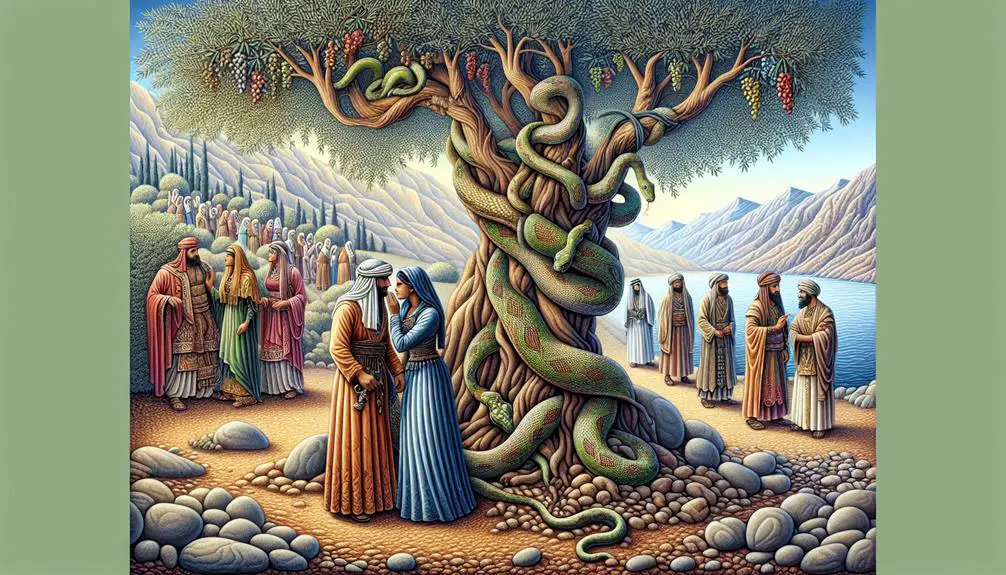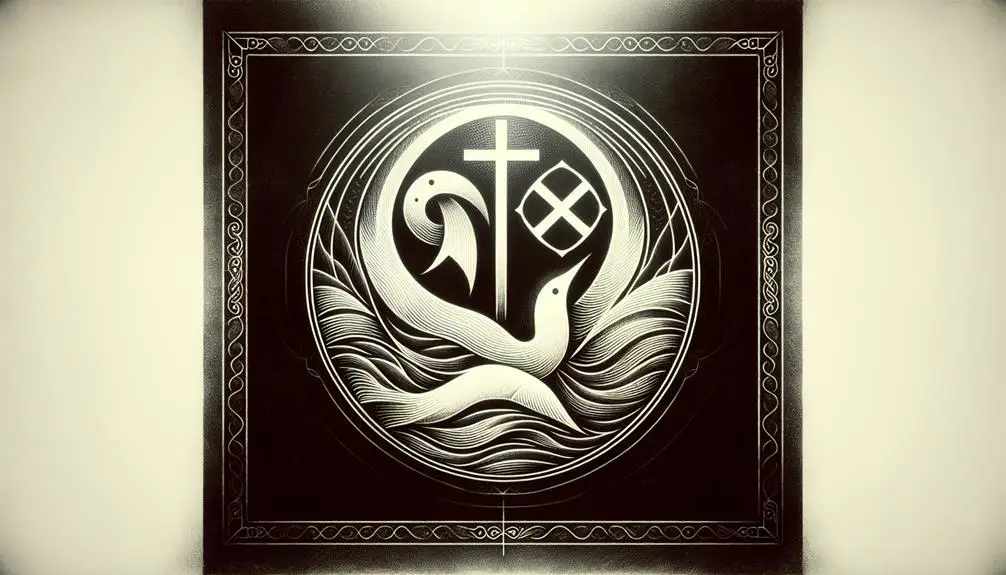Explore the profound implications of guile in biblical narratives, revealing insights into moral integrity and the essence of spiritual wisdom.

Guile Definition in the Bible
Grasping the concept of guile in the Bible garners significant spiritual insight. You'll find that this theme weaves through ancient narratives and teachings, challenging believers to discern its profound implications on moral conduct and integrity.
From the cunning schemes in the Old Testament to the admonishments against deceit in the New Testament, understanding guile's multifaceted role enhances your grasp on biblical ethics.
As you explore these scriptural landscapes, ponder how the lessons of guile inform modern faith and everyday life, inviting a deeper contemplation of its relevance in contemporary contexts.
Key Takeaways
- Guile in the Bible is associated with deceit, craftiness, and moral dilemmas.
- Biblical narratives use guile to explore ethical implications of deception.
- Overcoming guile is linked to spiritual growth and personal integrity.
- Modern faith applications stress honesty and transparency, drawing on biblical teachings.
Understanding Biblical Guile

In exploring the concept of guile within a biblical context, it's crucial to recognize that it often embodies deceit or cunning, employed with the intent to achieve one's goals. This notion, though seemingly straightforward, encompasses a range of actions and motivations, subtly nuanced by cultural interpretations and linguistic variations.
When you delve into guile synonyms like craftiness, slyness, or trickery, you're not just expanding your vocabulary; you're uncovering layers of meaning that reflect different shades of guile. Each synonym carries its own weight and connotation, shedding light on the multifaceted nature of deceit. This exploration isn't just academic; it's a journey into understanding how language shapes our moral and ethical perceptions.
The cultural interpretations of guile add another layer of complexity. What's considered cunning or deceitful can vary widely between societies. In some cultures, being able to navigate social and political landscapes with subtlety and cleverness is highly valued. In others, straightforwardness and honesty are the pillars of integrity, making any form of guile reprehensible. This dichotomy isn't just fascinating; it's essential to grasp if you're aiming to fully understand the biblical perspective on guile.
This analysis urges you to consider how context, both linguistic and cultural, plays a critical role in interpreting biblical texts. Guile, with its rich web of synonyms and diverse cultural interpretations, isn't just a word; it's a window into the complex interplay between language, morality, and society. Understanding this concept in its entirety requires you to look beyond the surface and appreciate the depth of its significance within the biblical narrative.
Guile in Old Testament Narratives

The Old Testament's narratives frequently showcase guile as a pivotal element in the unfolding of God's plan, revealing the complexity of human morality and divine justice. These stories aren't just ancient history; they're layered with lessons on the nuanced nature of deceit, where the line between right and wrong blurs in the face of greater outcomes.
Consider these pivotal instances:
- Jacob's deception of his father Isaac to obtain Esau's blessing—a moment that shaped the destiny of Israel.
- Joseph's strategy in dealing with his brothers, not only testing their integrity but also guiding them towards repentance.
- The cunning plan of Rahab, who lied to protect the Israelite spies, showcasing that sometimes, the act of deceit can indeed lead to salvation.
- The story of Esther, who cleverly concealed her Jewish identity to eventually save her people from genocide.
These narratives force you to ponder the complexity of guile within a biblical context. Jacob's deception, for example, isn't merely a tale of trickery but a deeply layered story about destiny, family dynamics, and divine election. Similarly, Joseph's strategic use of deceit not only reveals his wisdom and foresight but also highlights themes of forgiveness, reconciliation, and the mysterious ways in which God's justice unfolds.
Through these stories, you're invited to delve deeper into the ethical dilemmas posed by guile, understanding its role not just in biblical times but also in the broader spectrum of human behavior and divine governance.
New Testament Perspectives on Guile

Shifting focus to the New Testament, we'll uncover how guile is portrayed differently, reflecting a nuanced understanding of deceit in the light of Christ's teachings. The Apostolic teachings and the life of Jesus provide rich insights into the nature of guile and its place in Christian life.
You'll find that the New Testament does not shy away from discussing guileful expressions, but it does so with a distinct perspective. The emphasis is on transparency, truthfulness, and the avoidance of deceit in one's life. This reflects a broader moral and ethical framework that promotes integrity and sincerity as core values.
To make this discussion more engaging, let's look at a table summarizing key New Testament perspectives on guile:
Reference |
Context |
Insight on Guile |
|---|---|---|
John 1:47 |
Jesus commends Nathanael |
Highlighting the value of an absence of deceit |
1 Peter 2:1 |
Apostolic exhortation |
Encouraging believers to lay aside all guile |
2 Corinthians 12:16 |
Paul's defense of his conduct |
Rejecting guile in Apostolic ministry |
1 Thessalonians 2:3 |
Paul's ministry principles |
Asserting honesty in spreading the gospel |
James 3:14 |
Warning against hypocrisy |
Emphasizing truth in one's heart over guile |
Through these references, you'll see that the New Testament framework views guile as fundamentally incompatible with the life of a believer. Apostolic teachings consistently urge Christians to reject guileful expressions, advocating for a life led by truth and sincerity. This approach not only underscores the moral elevation sought in Christian ethics but also sets a clear standard for personal conduct.
Key Figures and Their Lessons

Having explored the New Testament's perspectives on guile, let's now examine the lessons imparted by key figures who embody these teachings.
Understanding guile's etymology and cultural interpretations offers an enriching backdrop to discerning its depiction in biblical narratives. These stories aren't merely historical accounts; they're rich with moral and ethical lessons that resonate across cultures and epochs. By delving into the lives of these figures, you gain a nuanced appreciation for the complex interplay between virtue and vice, sincerity and deceit.
Consider these key figures and the lessons they impart:
- Jacob: His journey from deception to redemption illuminates the transformative power of facing one's guile and striving for integrity.
- David: A man after God's own heart, yet not without fault, David's life teaches the importance of repentance and the consequences of guile.
- Peter: Known for his denial of Christ, Peter's later boldness and sincerity showcase the possibility of overcoming guile and embodying truth.
- Judas Iscariot: Perhaps the most infamous for his betrayal, Judas' story serves as a sobering reminder of the destructive potential of guile when allowed to fester.
These narratives, rich in cultural interpretations, guide us in understanding the multifaceted nature of guile. They encourage a reflective look at our own lives, urging us to discern where we might be harboring deceit and how we can move towards greater authenticity. Through these biblical lessons, you're invited to embark on a personal journey of introspection and growth, learning from those who've navigated the treacherous waters of guile before you.
The Moral Implications of Guile

You'll find that the Bible presents guile as a complex issue, with ethical concerns that prompt you to reflect on its place in human interactions.
When examining biblical figures, you notice a spectrum of behaviors, showcasing how guile intertwines with spiritual journeys and moral lessons.
Understanding these narratives can guide you towards overcoming guile for spiritual growth, highlighting the importance of integrity and honesty in one's faith journey.
Guile's Ethical Concerns
The ethical implications of guile delve into a complex realm, where its use often raises significant moral concerns within biblical contexts. Understanding guile's origins and its contemporary relevance can help unravel these ethical dilemmas.
- Guile as a tool for survival: Is it justifiable when used to protect oneself or others?
- The fine line between wisdom and deceit: Where does one draw the line in the sand?
- Impact on personal integrity: How does employing guile affect one's character and moral standing?
- Community trust: What're the ramifications of guile on societal bonds and trustworthiness?
Analyzing guile through these lenses offers a nuanced grasp of its ethical dimensions, encouraging a reflective and informed stance on its application in both historical and modern-day scenarios.
Biblical Figures and Guile
Exploring the ethical implications of guile leads us directly to the actions and decisions of biblical figures, whose stories offer profound insights into the moral complexities surrounding its use. When you dive into the narratives, you'll find guileful strategies at play, sometimes leading to pivotal moments in biblical history.
Yet, it's critical to discern the context in which these strategies were employed. Deceptive prophets, for instance, serve as cautionary tales, warning against the misuse of guile for personal gain or to mislead others away from truth. These stories aren't just ancient history; they're relevant discussions about integrity, honesty, and the consequences of deceit. They challenge you to reflect on the fine line between strategic wisdom and unethical deception.
Overcoming Guile: Spiritual Growth
Navigating the journey of spiritual growth requires confronting and overcoming guile, a challenge that invites deeper reflection on moral integrity. As you delve into this process, consider the following aspects to enhance your understanding and approach:
- Guile identification: Recognize the subtle manifestations of guile in thoughts and actions.
- Trust restoration: Rebuild broken relationships through honesty and transparency.
- Personal accountability: Hold yourself responsible for overcoming deceitful tendencies.
- Community support: Engage with a supportive spiritual community that encourages growth and integrity.
Addressing guile in these ways not only propels you forward in your spiritual journey but also strengthens your moral foundation, fostering an environment where trust and honesty flourish.
Navigating Guile in Modern Faith

Understanding guile's role within modern faith requires a thoughtful analysis of its biblical roots and contemporary implications. When you navigate the complexities of faith today, you're often faced with guileful interactions that test your faithful resilience. These moments demand a deep understanding of guility, as described in the Bible, and a conscious effort to apply these teachings in a world that's vastly different from the ancient times yet surprisingly similar in its challenges.
Biblical Guidance |
Modern Application |
|---|---|
Be wise as serpents, harmless as doves |
Approach situations with discernment, maintaining integrity |
Speak the truth in love |
Communicate honestly, but with compassion |
Beware of false prophets |
Stay vigilant against misleading influences |
Love your neighbor as yourself |
Treat others with genuine kindness, without ulterior motives |
Incorporating these principles into your daily life isn't just about avoiding deception; it's about cultivating an environment where authentic relationships can thrive. It's recognizing that while the world may advocate for cunning and deceit to get ahead, your faith calls you to a higher standard—one of transparency, integrity, and love.
Navigating guile in modern faith isn't about isolating yourself from the world but engaging with it more deeply, armed with the wisdom and guidance that your faith provides. This journey requires vigilance, discernment, and, most importantly, a heart that seeks to embody the teachings of the Bible in every interaction. By doing so, you not only protect yourself from the guile of others but also become a beacon of hope and trust in a world that desperately needs it.
Frequently Asked Questions
How Has the Interpretation of Guile Evolved in Different Christian Denominations Over the Centuries?
You've seen how interpretations of guile have shifted across Christian denominations over centuries, influenced by denominational semantics and historical contexts.
It's fascinating how each tradition parses the concept, weaving it through theological debates and cultural shifts.
This evolution isn't just academic; it reflects broader changes in understanding morality and human nature.
Are There Any Non-Canonical Texts That Offer a Different View on Guile Compared to the Canonical Bible?
Yes, you'll find that non-canonical texts, such as those rooted in Gnostic perspectives, offer a nuanced view on guile. These texts, including Apocryphal insights, diverge from the canonical Bible's depiction.
They often present guile in a more complex light, suggesting different moral and spiritual interpretations. Exploring these texts can provide you with a broader understanding of guile, enriching your perspective beyond the traditional Biblical narrative.
How Do Other Major World Religions Perceive and Define Guile in Comparison to Christianity?
Ever wondered how different cultures view slyness or cunning?
From an Islamic perspective, guile is often seen through the lens of intention and morality, where deceit for harmful purposes is condemned.
Similarly, the Hindu interpretation emphasizes karma and the long-term effects of deceitful actions.
Both perspectives, while unique, share a common thread with Christianity in valuing honesty and integrity, highlighting a universal disdain for deceit across major world religions.
In What Ways Has the Concept of Guile Influenced Christian Art and Literature Throughout History?
You'll find that guile's influence on Christian art and literature is profound. Artists and writers have used guile symbolism and artistic motifs to explore themes of deception, temptation, and redemption.
This symbolism often reflects deeper moral and theological questions, challenging viewers and readers to consider the nature of sin and forgiveness. Throughout history, these motifs haven't only decorated cathedrals and illuminated manuscripts but also enriched stories and teachings, providing layers of meaning to explore.
Can Psychological Studies on Deception and Honesty Provide a Modern Understanding of Guile That Aligns or Conflicts With Biblical Teachings?
Diving into the intricate world of deception psychology and honesty metrics, you'll find that modern studies can either align with or challenge traditional views on guile.
By analyzing how people deceive and value honesty today, you gain insights that may either echo or question biblical interpretations of guile.
This analytical journey respects both scientific findings and sacred texts, offering a nuanced understanding of human nature's complexities.
Conclusion
You might think understanding guile in a biblical context feels distant or irrelevant. Yet, its lessons are as vivid today as ever. Imagine navigating a world where wisdom and integrity blend, steering clear of deceit.
The Bible, from Old to New Testament, doesn't just condemn guile; it offers a path to genuine faithfulness. Reflecting on these narratives, you're equipped to face modern challenges with a heart free of deceit, embodying the integrity that scripture champions.



Sign up